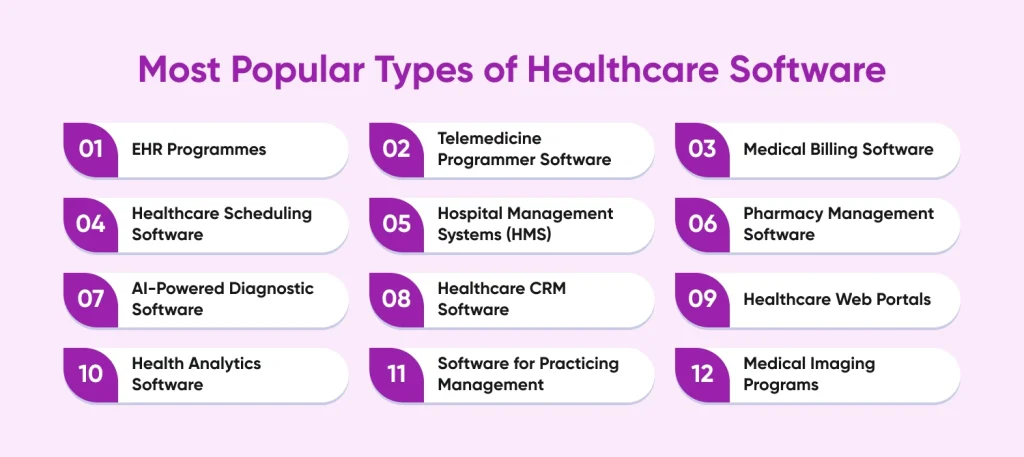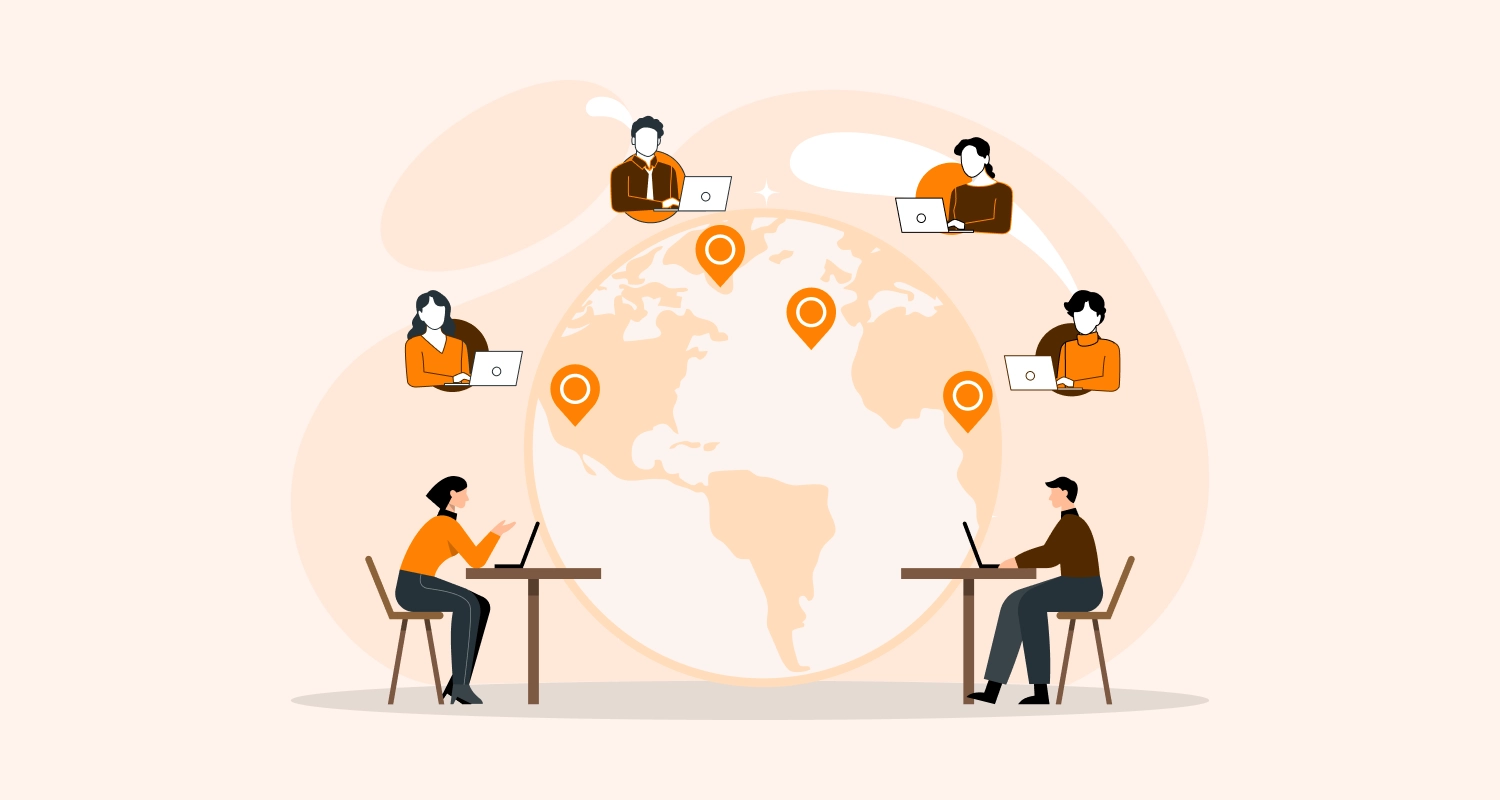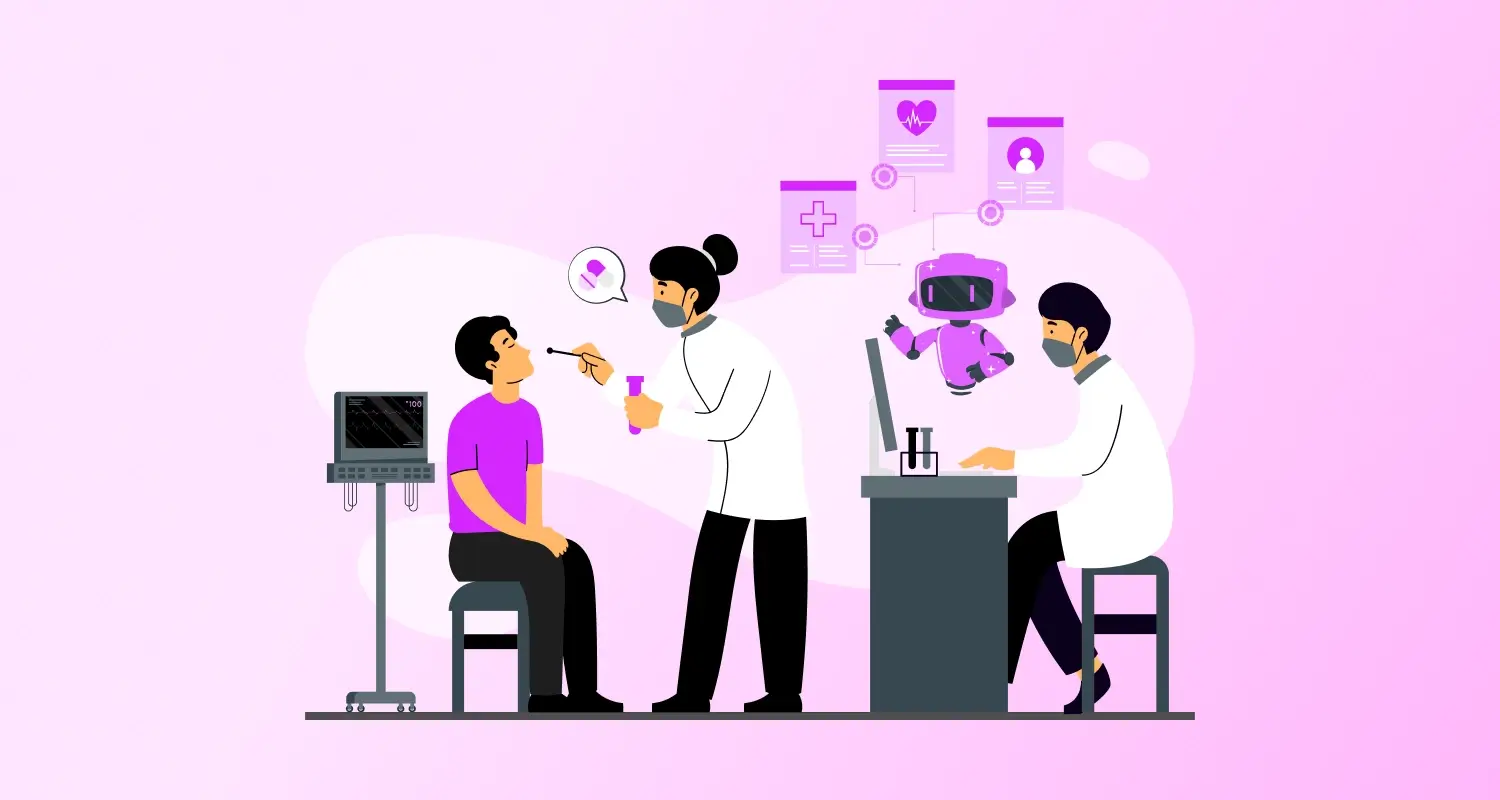Software development improvements have led to a technological change in the healthcare field. Healthcare companies now depend on a broad spectrum of software solutions to improve patient care, simplify processes, and maximize administrative chores.
From patient information management to automated appointment booking, various healthcare software solutions come with various valuable features that profoundly affect the healthcare industry.
With a Healthcare software development company on the line, you can develop best-in-class healthcare solutions that automate every part of healthcare operations.
Prior to making the choice for a development company, it is important to know various types of healthcare software to choose the one that fits your requirements.
Here, we will help you explore types of healthcare software.
Market for Healthcare Software: An Analysis
Driven by technological developments and the rising need for effective healthcare solutions, the fast-expanding healthcare software industry consists of several tools to enhance healthcare companies’ clinical, administrative, and financial activities. Essential software products include:
- Telemedicine systems.
- Electronic health records (EHR).
- Systems of healthcare administration.
- AI-powered diagnostic tools.
There are several Healthcare app ideas on the line taken on by healthcare centers and hospitals to improve patient care, simplify administrative tasks, and comply with legal criteria.
From hospitals clinics, to pharmacies, everyone is moving towards a Healthcare Software Development Company for custom healthcare solutions that meet all your requirements.
Most Popular Types of Healthcare Software

Electronic Health Record (EHR) Programmes
Among the most often used types of healthcare software, EHR systems transform patient data access, storage, and sharing. By digitizing medical records, these systems provide doctors with a complete picture of patient background.
Modern hospitals and clinics depend on EHR systems as they guarantee reliable and rapid access to patient data, lower documentation, and enhance general treatment quality. Furthermore, EHR software development for Healthcare guarantees that, from tiny businesses to big hospitals, the demands of distinct companies are satisfied by customizing. The EHR industry is set to pass $47 billion by 2027.
Key Features:
- Stores patient data such as medical history, prescriptions, and lab results.
- Facilitates easy sharing of information between healthcare providers.
- Enhances patient care through real-time access to critical medical information.
Telemedicine Programmer Software
Telemedicine software has become a necessary component of the healthcare sector as digital health develops. This type of healthcare software lets doctors digitally diagnose and treat patients, facilitating distant consultations.
Different types of software for healthcare providers, patients, and doctors have helped it become somewhat well-known. Telemedicine is expected to expand 17.96% by 2030.
To make the most of the market, choose a reliable healthcare software development company and end up developing feature-rich solutions.
Key Features:
● Video and audio consultations with healthcare providers.
● Integration with EHR systems to ensure seamless access to patient data.
● Remote monitoring of patients for chronic disease management.
Medical Billing Software
Managing the intricate financial systems in healthcare depends on medical billing software. These instruments assist with coding, claim submission, and payment management and guarantee that healthcare professionals are being compensated for delivered services.
These types of software used in healthcare billing systems guarantee a speedier reimbursement process, lower rejections, and help eliminate mistakes in claim filing. One of the many kinds of software used in the healthcare sector directly affecting the financial situation of healthcare organizations is this one.
Key Features:
● Automatic claims submission to insurance companies.
● Real-time updates on claim statuses.
● Integration with practice management and EHR systems for seamless operation.
Healthcare Scheduling Software
Although patient scheduling may be time-consuming, healthcare scheduling systems streamline the procedure. These technologies let patients schedule visits online, get reminders, and handle cancellations. For medical professionals, it guarantees the best use of resources, therefore lowering no-shows and increasing operational effectiveness.
If you want to create and build Healthcare scheduling software, emphasizing user experience and integration with other healthcare systems, including EHRs, can help your solution be stronger and more attractive to healthcare professionals.
Key Features:
● Automated appointment reminders for patients.
● Online booking options for patients.
Hospital Management Systems (HMS)
Hospital administration systems provide a whole answer for handling institutions’ financial, clinical, and administrative elements. To guarantee the seamless running of hospital operations, these healthcare software systems combine several departments, such as labs, pharmacies, and billing offices.
Automating important tasks helps HMS increase hospital administration’s effectiveness and facilitates departmental collaboration.
Key Features:
- Provides evidence-based recommendations for treatment.
- Alerts healthcare providers about potential drug interactions or allergies.
- Supports diagnostic decisions by analyzing patient data.
Pharmacy Management Software
Software for pharmacy administration is meant to simplify medication inventory control, prescription filling, and invoicing, among other aspects of pharmacy operations. These types of healthcare software help pharmacists guarantee accurate records, prevent stock shortages, and ensure timely patient refills.
Pharmacy management systems help healthcare professionals guarantee optimal medication administration, lowering the possibility of mistakes in drug dispersion.
Key Features:
- Advanced image processing and analysis tools.
- Integration with EHR systems for comprehensive patient data.
- 3D imaging and reconstruction capabilities.
AI-Powered Diagnostic Software
Next in the list of leading types of healthcare software is AI-powered diagnostic software. These types of healthcare solutions help healthcare centers in easily diagnose the patients so that healthcare providers can focus on treating patients.
The impact of AI-powered healthcare startups is great in the journey of developing AI-powered healthcare software, which makes the work easier for hospitals, saving a lot of time. AI-powered diagnostic software makes the best use of machine learning algorithms to determine medical data to provide quicker, more accurate diagnoses.
Key Features:
- Patient tracking and communication tools.
- Automated reminders for appointments and follow-ups.
- Integration with EHR systems to access patient data.
Healthcare CRM Software
Software for healthcare customer relationship management (CRM) lets medical professionals handle patient contacts, enhance correspondence, and deliver individualized treatment. It gathers and evaluates patient information so that healthcare companies may provide improved services catered to particular requirements.
Using healthcare CRM systems will help clinicians establish closer bonds with patients, raising satisfaction and retention rates.
Key Features:
- Sample tracking and management.
- Automated data entry and result analysis.
- Compliance with regulatory standards for lab operations.

Healthcare Web Portals
Online tools called healthcare web portals let patients see their medical information, interact with their doctors, and schedule visits. The empowerment of patients to take charge of their healthcare path depends on these portals.
Healthcare web Development solutions combining online portals with other healthcare systems may provide a flawless user experience for those trying to improve patient engagement.
Key Features:
- Advanced algorithms for diagnosing diseases based on patient data.
- Integration with existing EHR and clinical systems.
- Predictive analytics for better treatment outcomes.
Health Analytics Software
Designed to examine healthcare data, health analytics tools help to improve patient outcomes, increase operational efficiency, and best allocate resources. This software solution collects information from a range of sources like EHR systems and then implements analytics to provide valuable insights.
Key Features:
● Inventory management and drug tracking.
● Prescription management and refill tracking.
● Automated alerts for low stock and medication expiration.
Software for Practicing Management
The aim of practice management systems (PMS) is to automate administrative chores in healthcare institutions. This program lessens the administrative load and increases effectiveness by helping medical professionals handle daily billing, scheduling, and reporting tasks.
There are practice management tools in various types of healthcare software that keep an eye on hospitals, clinics, and other healthcare establishments. Hence, it assits in in streamlining the healthcare operations so that healthcare centers can focus on serving patients and rest free from administrative burdens.
Key Features:
● Automates billing and claims management.
● Simplifies appointment scheduling.
● Helps in managing healthcare provider workflows efficiently.
Medical Imaging Programs
Medical Imaging Programs is among the leading types of healthcare software solutions that makes most of the tasks easier for doctors. With these software solutions, doctors can get real time medical reports which include X-rays, MRIs, and CT scans at their fingertips.
There are several types of medical professionals and Radiologists prominently depend on precise imaging to diagnose and treat patients.
Key Features
- Secure access to personal health records.
- Online appointment booking and prescription refills.
- Direct communication with healthcare providers.
Conclusion
Software is increasingly important in today’s healthcare environment regarding operational optimization, patient care enhancement, and innovation stimulation. Essential for healthcare practitioners, medical startups, and healthcare technology firms are the many forms of healthcare software we have discussed in this article. Understanding these software solutions is essential whether your goal is to work with a Healthcare software development company or want to build a medical tech startup.
From EHR software development for Healthcare to AI software development services, healthcare is an excellent canvas for creativity. Adopting these many kinds of software used in the healthcare sector will be crucial to remain competitive and provide high-quality treatment as the industry develops.
Frequently Asked Questions
How does healthcare software improve patient care?
Some of the benefits of the health software commonly used in the field of healthcare include improved patient records management, efficient sharing of information and real-time results, diagnosis tools and treatment planning, and health monitoring and management which contribute to the overall improvement of patient care.
How do healthcare management systems help hospitals?
Healthcare management systems assist hospitals in increasing organizational efficiency and patient satisfaction by reorganizing administrative work and duties, rationing resources, organizing the schedules of patients and their appointments, and minimizing paperwork.
What security features should healthcare software include?
Some features that should be implemented in healthcare software are data encryption, MFA, safe data storage, and adherence to existing legislation, such as HIPAA.
How does AI-based healthcare software help in pandemic management?
AI applied in healthcare software helps manage outbreaks, data processing on vast information for tracking purposes in real-time, resource management, the creation of protocols for treatments, and even supporting the development of treatment protocols and vaccines.







